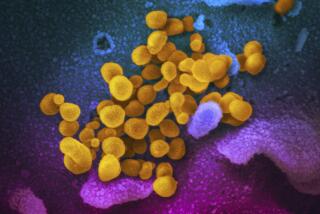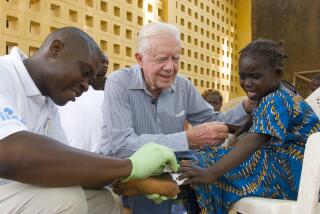Science: The ‘War on Cancer’ turns 40
- Share via
In December 1971, President Nixon signed the National Cancer Act, which provided additional funds for the National Cancer Institute and symbolically launched what came to be known as the “War on Cancer.”
The journal Science marks the 40th anniversary of the law with a package of news stories and studies that report on current progress in the fight against the disease.
In some ways, editors wrote, the battle hasn’t progressed very far. In 1971, Science published papers asking:
- how abnormalities in chromosome number arise in tumor cells,
- whether tissue-specific markers can help determine the origin of some tumors
- whether the immune system can be engineered to recognize cancer cells as “foreign invaders” and target them for elimination, and
- whether viruses play a role in the disease.
Scientists have answered that last question: Yes, viruses are involved. But beyond that researchers still seek definitive answers to these decades-old questions.
The special section offers a review of U.S. cancer trends (incidence and 5-year mortality) and a timeline of progress in the “war.” It also includes articles on advances in fighting resistance to targeted cancer therapies such as the leukemia drug Gleevec and the lung cancer drugs Iressa and Tarceva (one possible answer: combining multiple drugs to stay one step ahead of the disease) and on the skyrocketing costs of cancer treatment.
In an accompanying paper on cancer genomes, researcher Dr. Michael Stratton of the Wellcome Trust Sanger Institute wrote that scientists’ understanding of the mutations involved in tens of thousands of human cancers is nearing an “end game.” Today, researchers can sequence whole cancer genomes and compare them with normal cell genomes to isolate key cancer-linked mutations. Understanding how such mutations contribute to the development of disease might help researchers design drugs and diagnostic tools, Stratton wrote.
Forty years from now, researchers will be able to assess that progress, as well.
Read more from “The Cancer Crusade at 40”. Access is free with registration.
More to Read
Sign up for The Wild
We’ll help you find the best places to hike, bike and run, as well as the perfect silent spots for meditation and yoga.
You may occasionally receive promotional content from the Los Angeles Times.











